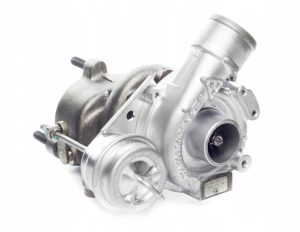
Turbocharger and excessive oil consumption – causes and diagnosis methods
The turbocharger is a key component of modern engines, enhancing their performance and efficiency. However, its improper operation can lead to excessive oil consumption, which may result in severe engine damage. In this article, we will discuss how the turbocharger affects oil consumption, what symptoms indicate problems, and how to diagnose and repair them.
How does the turbocharger affect oil consumption?
The turbocharger is lubricated with engine oil, which cools and protects the turbine bearings. If the lubrication system or seals in the turbocharger fail, oil may leak into the intake or exhaust system, causing excessive burning of oil.
The most common causes of excessive oil consumption related to the turbocharger are:
- Worn turbocharger seals – oil leaks into the intake or exhaust system, causing it to burn.
- Excessive oil pressure – can cause oil to pass through the turbocharger seals.
- Contaminated oil lines – limited oil flow can cause overheating and damage to the turbine bearings.
- Clogged or malfunctioning PCV valve (breather) – excess pressure in the crankcase may force oil through the turbocharger.
- Improper use – turning off the engine without cooling the turbo leads to oil coking and internal damage.
Symptoms of a worn or damaged turbocharger
If the turbocharger is causing excessive oil consumption, the following symptoms may appear:
- Blue smoke from the exhaust – burning oil in the exhaust system produces characteristic blue smoke.
- Excessive oil consumption – frequent need to top up oil may indicate leaks through the turbocharger.
- Oil traces in the intake system – after removing the intake pipe, accumulated oil may be visible.
- Loss of engine power and performance – a damaged turbocharger may not function properly, leading to a loss of boost.
- Whistling, knocking, or other unusual turbo sounds – may indicate damaged turbocharger bearings.
How to check if the turbocharger is the cause of excessive oil consumption?
- Check the intake system – inspect the intake hoses and intercooler for the presence of oil.
- Inspect the exhaust system – oil leaking through the turbocharger may settle in the exhaust system, causing smoking.
- Check the turbine shaft play – excessive play indicates worn bearings and possible oil leaks.
- Measure the boost pressure – abnormal pressure may indicate leaks in the turbocharger.
- Test the crankcase pressure – excessive pressure can force oil through the turbocharger.
Is turbocharger replacement always necessary?
Not always. In some cases, the issue can be resolved without the costly replacement of the entire turbocharger. Possible solutions include:
- Cleaning and replacing seals – if the seals are worn but the turbine itself is not severely damaged, replacing the seals may help.
- Checking and cleaning the PCV system – a leaky breather valve can cause excess pressure and oil leakage through the turbo.
- Flushing the oil lines – accumulated contaminants can limit oil flow and cause lubrication issues.
- Using the proper oil – it is recommended to use oils that meet the manufacturer’s specifications, which better withstand the high temperatures in the turbocharger.
Conclusion
The turbocharger is one of the key elements of an engine, but its improper operation can lead to excessive oil consumption. Regular inspection, using the proper oil, and correct operation can prevent premature damage. It is important to regularly check the intake and exhaust systems to detect the first signs of turbocharger issues and avoid costly repairs.
